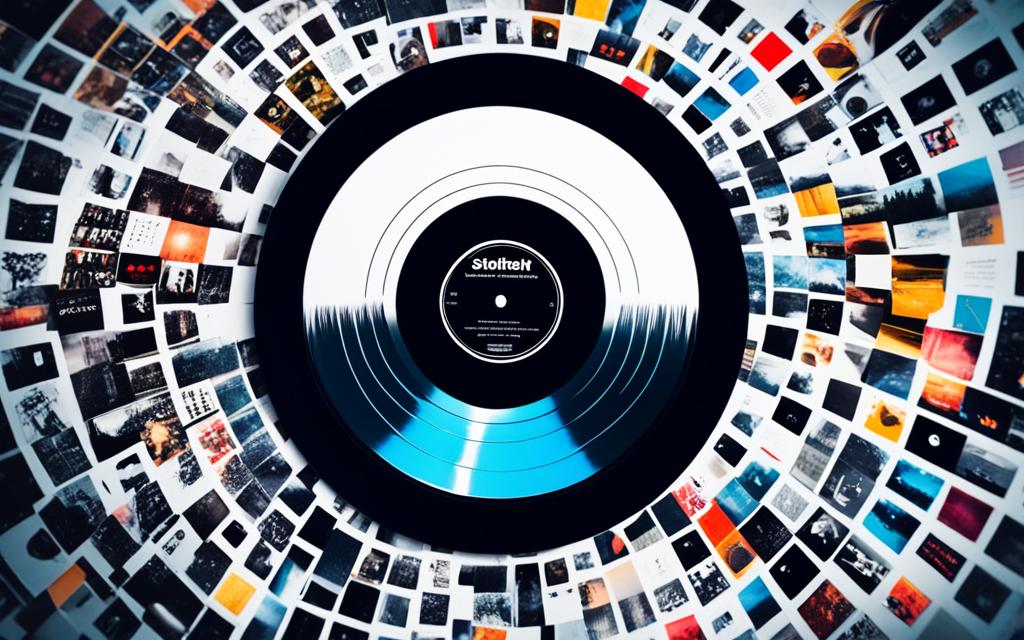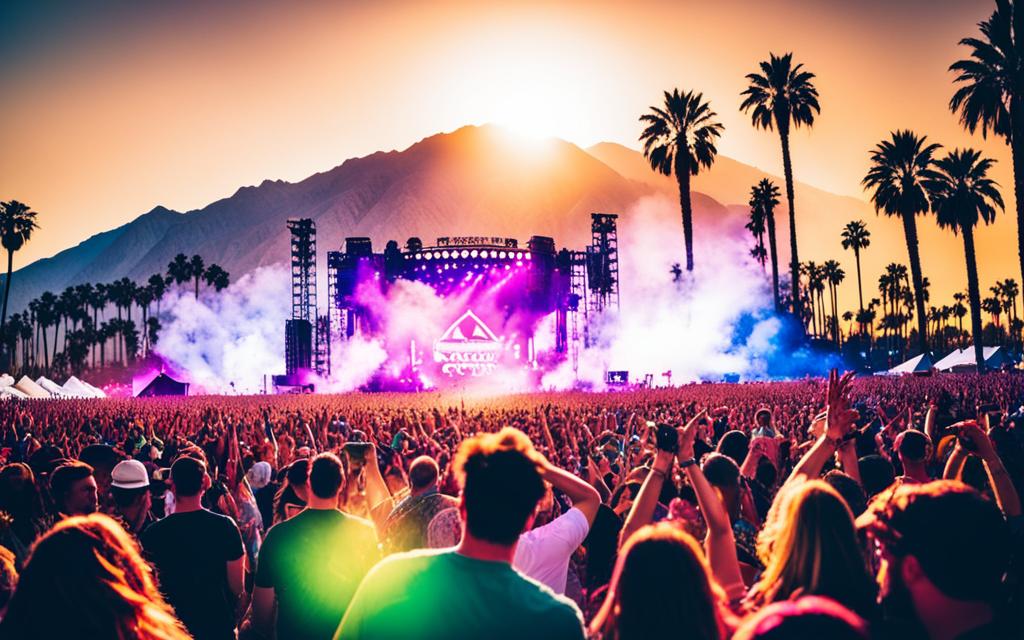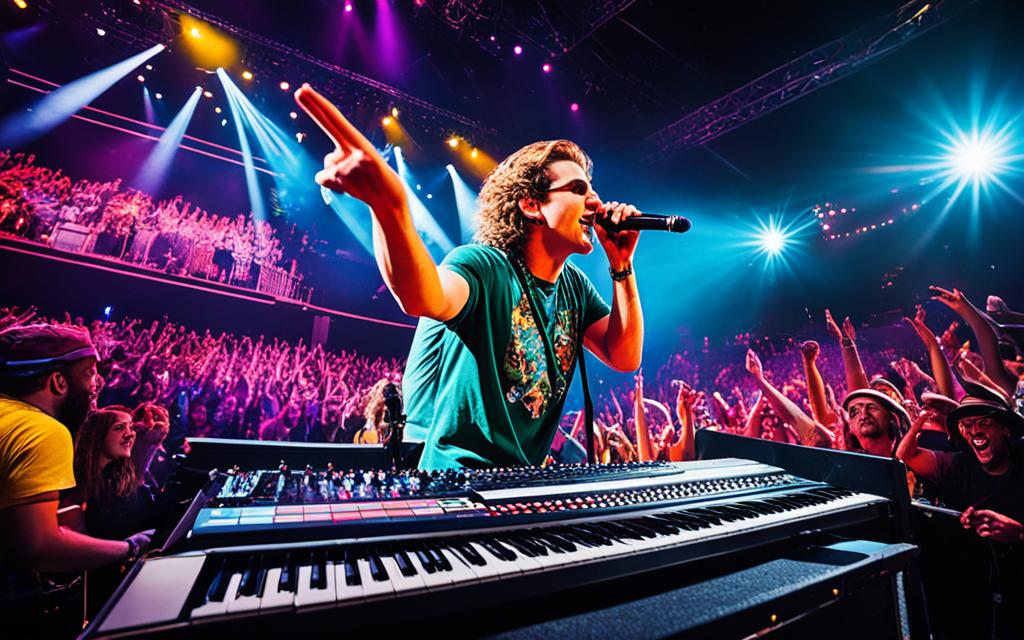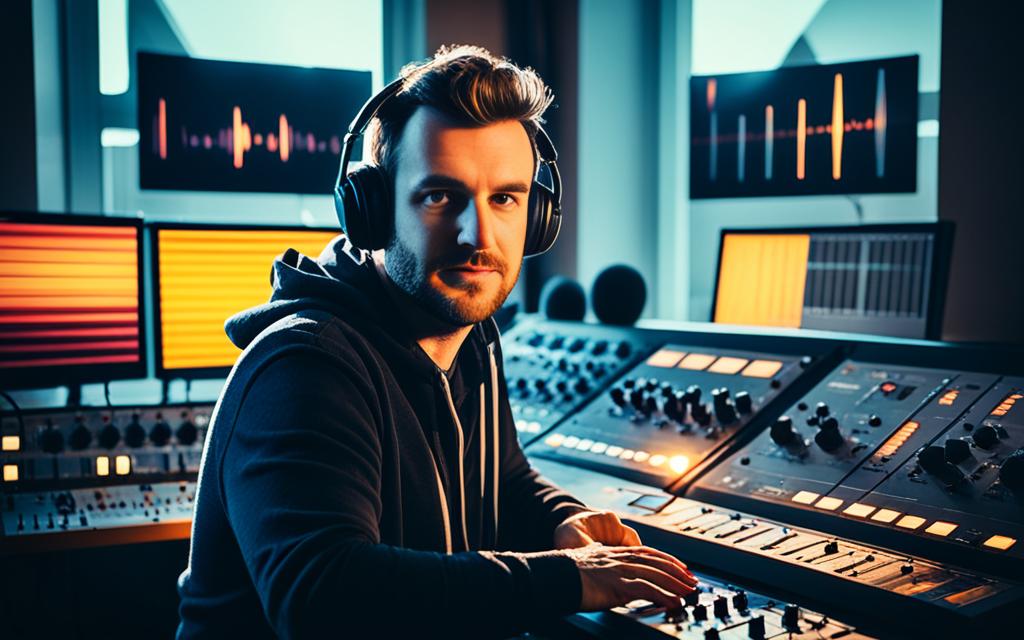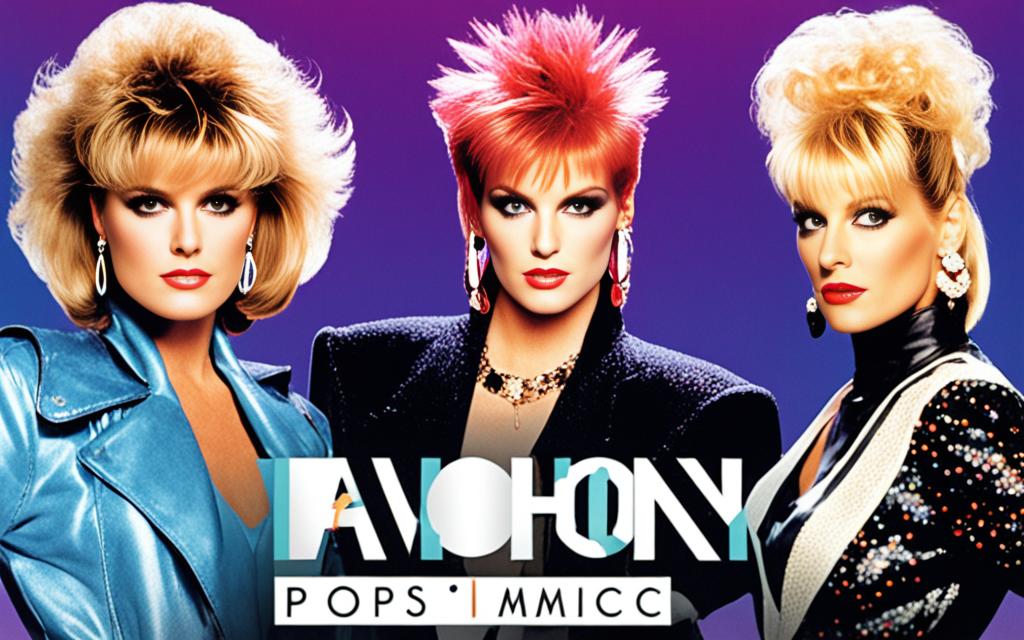Welcome to the digital age, where social media is revolutionizing every aspect of our lives. From connecting with friends to sharing experiences, social media has become an integral part of our daily routine. But its impact extends far beyond personal interactions; it is now reshaping industries, and none more so than the music industry.
Social media has ushered in a new era of possibilities for musicians, enabling them to reach audiences on a global scale like never before. Artists can now connect directly with fans, promote their music effortlessly, and even shape the entire music landscape. The power dynamics have shifted, and social media is the driving force.
The rise of music streaming platforms, such as Spotify, Apple Music, and SoundCloud, has been a game-changer. These platforms have disrupted the traditional distribution model and allowed artists to reach a wider audience instantaneously. With streaming services dominating the music consumption landscape, it’s clear that the way we discover and listen to music has been permanently altered.
But social media’s influence doesn’t stop at distribution; it has become an indispensable promotional tool. Artists can leverage platforms like Instagram, Twitter, and YouTube to build a loyal fan base, showcase their talent, and engage with their audience directly. Social media has leveled the playing field, giving independent artists unprecedented opportunities for success.
Speaking of engagement, social media has transformed the way artists interact with their fans. From live streaming concerts and behind-the-scenes glimpses to hosting Q&A sessions, musicians can foster a deeper connection with their audience. The ability to respond to comments, share updates, and even collaborate with fans has created a sense of closeness that was previously unimaginable.
This newfound closeness has had a direct impact on music sales and charts. Social media has become a powerful catalyst for viral hits and chart-topping success. With platforms like TikTok driving trends and creating overnight sensations, the music landscape is evolving at an unprecedented pace.
Let’s dive into some case studies to understand how social media has fueled the success of artists like Taylor Swift, BTS, and Drake. We’ll explore their strategies and the impact it had on their careers, shedding light on the immense power of social media in the music industry.
So, what does the future hold for social media and music? As technology continues to advance, we can expect even more innovative ways for artists to connect with their fans and monetize their craft. From virtual reality concerts to immersive fan experiences, the possibilities are endless.
In this series, we will delve deep into the ever-evolving relationship between social media and the music industry. Join us as we explore the impact, the success stories, and the future trends that are shaping the way we consume and engage with music.
The Rise of Music Streaming Platforms
Over the past decade, we have witnessed a seismic shift in the way people consume music. The rise of music streaming platforms has revolutionized the industry, providing music lovers with instant access to millions of songs at their fingertips. Platforms like Spotify, Apple Music, and YouTube have become the go-to destinations for music enthusiasts, offering a convenient and personalized listening experience.
With the advent of music streaming platforms, the era of physical albums and CDs has taken a backseat. Today, more people are opting for digital streaming services, which allow them to create their own playlists and discover new artists effortlessly. The convenience, affordability, and vast libraries offered by these platforms have made them incredibly popular among music enthusiasts of all ages.
“Music streaming platforms have democratized the industry, giving artists from various backgrounds and genres a chance to reach a wider audience. These platforms have become a breeding ground for talent, with emerging artists finding success by gaining significant traction through streaming.”
The rise of music streaming platforms has also had a transformative impact on the way artists create and release music. With streaming services becoming the primary mode of music consumption, artists are adapting their creative processes to suit the streaming environment. Attention-grabbing intro hooks, shorter song lengths, and strategic placement within popular playlists are just some of the tactics artists employ to stay relevant in the streaming era.
The Benefits of Music Streaming Platforms
Music streaming platforms offer numerous benefits to both artists and listeners. For artists, these platforms provide a wider reach and audience engagement, allowing them to connect with fans from all corners of the world. They also offer valuable data and insights into listener behavior, helping artists understand their audience better and refine their creative strategies.
For listeners, music streaming platforms provide a vast and diverse selection of music genres and artists, eliminating the need to purchase individual albums or songs. The ability to create personalized playlists and explore curated playlists tailored to their tastes enhances the overall music discovery experience.
The rise of music streaming platforms has forever changed the landscape of the music industry. As technology continues to evolve, it will be fascinating to see how these platforms further shape the way we consume and interact with music.
Social Media as a Promotional Tool
In today’s digital age, social media has become an indispensable tool for musicians and artists to promote their work and connect with their audience. With platforms like Instagram, Twitter, and Facebook, artists now have unprecedented opportunities to reach millions of fans around the world, making social media a game-changer in music marketing strategies.
One of the key advantages of using social media as a promotional tool is its ability to create direct and personal connections with fans. Artists can share behind-the-scenes glimpses into their creative process, engage in real-time conversations, and showcase their personalities. By building this authentic connection, artists can develop dedicated fan bases who are not only passionate about their music but also invested in their journey.
Social media platforms also offer artists a cost-effective way to reach a wider audience. Rather than relying solely on traditional marketing methods, such as television or radio ads, artists can leverage the power of social media to amplify their reach. Through targeted advertising and organic content creation, artists can tailor their promotion to specific demographics, ensuring that their music reaches the right ears.
Additionally, social media provides a platform for artists to showcase their creativity beyond their music. Artists can use visually stunning images, engaging videos, or compelling storytelling to captivate their audience and create a memorable brand. By curating a unique and visually appealing social media presence, artists can attract new listeners and establish themselves as trendsetters in the industry.
Moreover, social media allows artists to gather valuable insights and feedback from their fans. By monitoring comments, likes, and shares, artists can gauge the reception of their music and adjust their strategies accordingly. This direct line of communication with fans enables artists to stay connected, understand their audience’s preferences, and continuously refine their music to cater to their fanbase.
In conclusion, social media has revolutionized the music industry by providing artists with a powerful promotional tool. By utilizing the various features and targeting capabilities of social media platforms, artists can reach a wider audience, create personal connections with fans, and establish their unique brand. To succeed in the ever-evolving music landscape, leveraging social media as a promotional tool has become an essential strategy for artists.
Engaging with Fans Online
Social media has revolutionized the way musicians interact with their fans. By leveraging platforms like Facebook, Twitter, Instagram, and TikTok, artists can establish a direct line of communication with their audience, fostering a sense of connection and community. This engagement is crucial in today’s digital age, where fans seek a more personalized and intimate experience.
One of the key benefits of engaging with fans online is the role influencers play in music promotion. Influencers, who have built a loyal following on social media, have the power to sway opinions and drive trends. Collaborating with influencers can expose your music to a wider audience and create a buzz, resulting in increased visibility and potential sales.
Moreover, fan involvement has become an integral part of music promotion strategies. Artists often rely on their fans to spread the word about their music, whether it’s through sharing their latest release on social media or participating in challenges and contests. By actively involving their fans, musicians can tap into the passion and dedication of their audience, turning them into brand ambassadors.
Crowdsourcing is another way artists engage with their fans online. They may ask their followers to contribute to album artwork, create remixes, or even help curate playlists. This not only encourages fan participation but also gives them a sense of ownership and pride in the final outcome. In return, artists gain valuable insights and feedback, ensuring that their music resonates with their audience.
“Engaging with fans online allows artists to create a deeper connection with their audience. By showing genuine interest in their fans’ lives and opinions, artists can foster a sense of loyalty and appreciation.”
Maintaining an active online presence also allows artists to stay relevant and on top of emerging trends. By monitoring conversations and engaging in real-time, musicians can adapt their strategies and respond to the wants and needs of their fans. This agility is key in an industry that constantly evolves, helping artists stay ahead of the curve and maintain a competitive edge.
Overall, engaging with fans online is no longer an option but a necessity for musicians in today’s digital landscape. The power of social media, combined with the role of influencers and fan involvement, has transformed the way music is promoted and consumed. Embracing these strategies not only allows artists to foster a dedicated fan base but also opens doors to new opportunities and collaborations.
| Benefits of Engaging with Fans Online | Examples of Fan Involvement |
|---|---|
|
|
Impact on Music Sales and Charts
Social media has had a profound impact on the music industry, particularly when it comes to music sales and chart success. With the rise of platforms like TikTok and Instagram, songs have the potential to go viral overnight, propelling artists to new heights of popularity and influence.
One of the key ways social media impacts music sales is through its ability to create trends. A popular song that gains traction on social media can quickly become a hit, driving streams and downloads. This can have a direct impact on an artist’s sales and revenue, as well as their position on the charts.
Furthermore, social media platforms provide a unique opportunity for artists to engage directly with their fans, fostering a deeper connection and loyalty. Through regular updates, behind-the-scenes content, and live interactions, musicians can build a dedicated fanbase that is more likely to support their music financially. This fan engagement can drive music sales and boost an artist’s chart position.
It’s important to note that the impact of social media on music sales and charts extends beyond just individual artists. It has also created a shift in the way the music industry measures success. Traditional metrics like album sales and radio play are no longer the sole determinants of an artist’s popularity. Metrics like streams, engagement on social media, and viral moments now play a significant role in determining an artist’s chart success.
Overall, social media has revolutionized how music is consumed, shared, and promoted. It has given artists the power to connect directly with fans, bypassing traditional gatekeepers and industry norms. As a result, social media’s impact on music sales and charts is undeniable, shaping the landscape of the industry and providing new opportunities for artists to thrive.
Case Studies of Social Media Success
Social media has revolutionized the music industry, offering artists unique opportunities to connect with fans, promote their work, and achieve unprecedented success. In this section, we will explore a few notable case studies that demonstrate the power of social media in propelling artists to stardom.
Ariana Grande: Harnessing the Power of Twitter
“Twitter has been an incredible platform for me to directly engage with my fans and build a strong connection. It’s allowed me to showcase my personality and share glimpses into my creative process.”
Ariana Grande is known for her massive social media following, and she owes much of her success to her strategic use of Twitter. By consistently posting updates, engaging with fans, and sharing exclusive content, she has fostered a loyal fan base that eagerly supports her music and attends her concerts.
BTS: Conquering the World Through Instagram
“Instagram has been a game-changer for us. Through visually captivating posts and behind-the-scenes footage, we have been able to connect with fans worldwide and spread our music to new audiences.”
BTS, the globally acclaimed K-pop group, has leveraged Instagram as a key promotional tool. With their visually stunning posts and clever use of hashtags, they have attracted millions of followers and garnered international recognition. Their social media presence has played a crucial role in their rise to global superstardom.
Lizzo: Going Viral on TikTok
“TikTok has been an incredible platform for me to showcase my unique style and interact directly with my fans. The viral dance challenges and meme culture have played a pivotal role in propelling my music into the mainstream.”
Lizzo, the Grammy-winning artist, initially gained traction through TikTok. Her empowering and infectious songs became the soundtrack to popular dance challenges, which spread rapidly across the platform. This viral exposure helped Lizzo reach new audiences and solidify her position as a force to be reckoned with in the music industry.
These case studies demonstrate the immense potential of social media as a tool for success in the music industry. Artists who strategically leverage platforms like Twitter, Instagram, and TikTok can connect with fans on a deeper level, expand their reach, and propel their careers to new heights.
Future Trends in Social Media and Music
As social media continues to evolve, the future of the music industry is set to be revolutionized by new trends and technologies. With advancements in artificial intelligence, virtual reality, and live streaming, the way we consume and engage with music is expected to undergo significant transformations.
One major trend on the horizon is the integration of music streaming platforms with social media networks. This will enable users to discover, share, and interact with music seamlessly within their favorite social media apps. Imagine browsing through your Facebook feed and instantly listening to the latest releases from your favorite artists without leaving the platform.
Another exciting development is the rise of interactive concert experiences through virtual reality. Artists will be able to connect with their fans in new and immersive ways, allowing them to attend live performances from the comfort of their own homes. This will not only provide convenience for music lovers around the world, but also open up new revenue streams for artists.
Furthermore, the future will see an increased focus on data analytics and personalized content. Social media platforms will use machine learning algorithms to analyze user behavior and preferences, enabling artists to tailor their music and marketing strategies to specific audience segments. This will result in more targeted and engaging content, strengthening the bond between artists and their fans.

